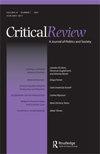后真相政治与思想竞争
IF 1.7
3区 社会学
Q4 POLITICAL SCIENCE
引用次数: 0
摘要
摘要“后真相”政治经常被认为是思想竞争的失败。然而,人们对思想的竞争有不同的思考方式,对我们理解其好处和风险的方式也有不同的含义。界定思想竞争的主要方式是从市场的角度出发,然而,这掩盖了思想竞争的不同方式。一些理论家可以帮助我们通过思想的竞争进行思考。例如,J.S.Mill避免了市场的隐喻,而是将重点放在竞争上,将其作为在批判性观众面前进行对抗性交锋的论据测试。格奥尔格·西梅尔(Georg Simmel)将竞争视为一种间接冲突,两个人同时努力获得观众的认可。这种观点强调在“人人共享”的竞争中的创新和创造力。最近,理论家们通过思考一个不是为了思想而是为了合理化的市场,发展了竞争的市场逻辑。这阐明了西梅尔竞争观的一些特征,但低估了确保竞争产品所需的约束程度。最终,认识到公共领域的这些不同竞争模式可以丰富我们的协商民主理论,并强化我们对“后真相”政治问题的看法。本文章由计算机程序翻译,如有差异,请以英文原文为准。
Post-Truth Politics and the Competition of Ideas
ABSTRACT “Post-truth” politics is often framed as a failure of the competition of ideas. Yet there are different ways of thinking about the competition of ideas, with different implications for the way we understand its benefits and risks. The dominant way of framing the competition of ideas is in terms of a marketplace, which, however, obscures the different ways ideas can compete. Several theorists can help us think through the competition of ideas. J. S. Mill, for example, avoided the metaphor of the market by focusing, instead, on competition as the testing of arguments in adversarial encounters before a critical audience. Georg Simmel, alternatively, conceived of competition as a form of indirect conflict, where two individuals strive in parallel to gain audience approval. This view emphasizes innovation and creativity in the competition of “all for all.” More recently, theorists have developed the market logic of competition by thinking of a marketplace not for ideas but for rationalizations. This articulates some of the features of Simmel’s view of competition, but underestimates the degrees of constraint required to secure the goods of competition. Ultimately, recognizing these different modes of competition in the public sphere can enrich our theories of deliberative democracy and sharpen our view of the problem of “post-truth” politics.
求助全文
通过发布文献求助,成功后即可免费获取论文全文。
去求助
来源期刊

Critical Review
POLITICAL SCIENCE-
CiteScore
1.30
自引率
12.50%
发文量
17
期刊介绍:
Critical Review: A Journal of Politics and Society is a political-science journal dedicated to advancing political theory with an epistemological bent. Recurrent questions discussed in our pages include: How can political actors know what they need to know to effect positive social change? What are the sources of political actors’ beliefs? Are these sources reliable? Critical Review is the only journal in which the ideational determinants of political behavior are investigated empirically as well as being assessed for their normative implications. Thus, while normative political theorists are the main contributors to Critical Review, we also publish scholarship on the realities of public opinion, the media, technocratic decision making, ideological reasoning, and other empirical phenomena.
 求助内容:
求助内容: 应助结果提醒方式:
应助结果提醒方式:


